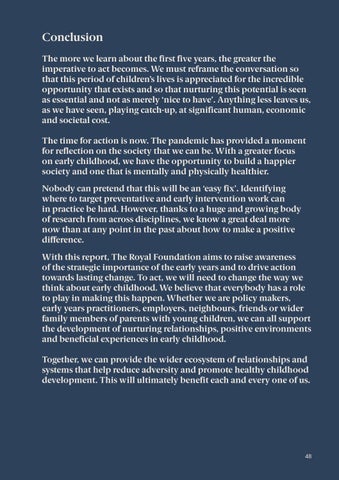Conclusion The more we learn about the first five years, the greater the imperative to act becomes. We must reframe the conversation so that this period of children’s lives is appreciated for the incredible opportunity that exists and so that nurturing this potential is seen as essential and not as merely ‘nice to have’. Anything less leaves us, as we have seen, playing catch-up, at significant human, economic and societal cost. The time for action is now. The pandemic has provided a moment for reflection on the society that we can be. With a greater focus on early childhood, we have the opportunity to build a happier society and one that is mentally and physically healthier. Nobody can pretend that this will be an ‘easy fix’. Identifying where to target preventative and early intervention work can in practice be hard. However, thanks to a huge and growing body of research from across disciplines, we know a great deal more now than at any point in the past about how to make a positive difference. With this report, The Royal Foundation aims to raise awareness of the strategic importance of the early years and to drive action towards lasting change. To act, we will need to change the way we think about early childhood. We believe that everybody has a role to play in making this happen. Whether we are policy makers, early years practitioners, employers, neighbours, friends or wider family members of parents with young children, we can all support the development of nurturing relationships, positive environments and beneficial experiences in early childhood. Together, we can provide the wider ecosystem of relationships and systems that help reduce adversity and promote healthy childhood development. This will ultimately benefit each and every one of us.
48





